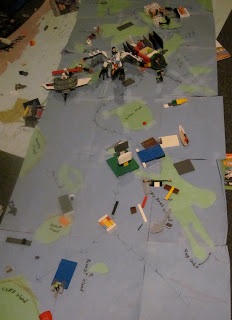 |
| The best geography lesson I never came up with. |
Now, if was at the point where I was ready to 100% embrace unschooling, this is what school would be like all of the time. I've talked about toying with unschooling in some of my previous posts, ( Homeschool Changes and (F)unschooling), but is not something we do 100% of the time. From what I've learned, you are not really unschooling unless you do it 100%. I'll be honest here, this annoys me a little bit. I, like so many homeschoolers, have a very eclectic approach. I like to take the parts of things that I like.
According to Carol Edson,
“Unschooling to me means learning what one wants, when one wants, in the way one wants, where one wants, for one’s own reasons. The learning is learner-directed; advisors or facilitators are sought out as desired by the learner. There are no curricula, lesson plans, schedules, or agendas. Most of the learning is quiet, even invisible, as there is not a focus on creating a lot of ‘products.’”
Mary Griffith defines it more precisely as needing these three factors:
From On Unschooling
1. An Environment Conducive to Exploration and Experimentation.
2. Adults as Models and Facilitators
3. Trust That the Child Will Learn.
I do really well with "rules" 1 and 2. I kind of agree with number three, but I'm unable to completely "let-go" and not guide my child's learning in some way. I DO give "assignments". We use the Workboxes System which is, by its nature, parent directed. The assignments I give, and put into the workboxes, are based on my kids and how well I know them. Scootch told me, at the end of the summer, that he wanted to study geometry and physics. So, when I give him math and science assignments, they are in these areas. I ask him to pick out experiments he wants to try from the book on physics experiments. I put books and magazines in their boxes that I think they would want to read. I assign them lego projects from Lego Quest.
2. Adults as Models and Facilitators
3. Trust That the Child Will Learn.
I do really well with "rules" 1 and 2. I kind of agree with number three, but I'm unable to completely "let-go" and not guide my child's learning in some way. I DO give "assignments". We use the Workboxes System which is, by its nature, parent directed. The assignments I give, and put into the workboxes, are based on my kids and how well I know them. Scootch told me, at the end of the summer, that he wanted to study geometry and physics. So, when I give him math and science assignments, they are in these areas. I ask him to pick out experiments he wants to try from the book on physics experiments. I put books and magazines in their boxes that I think they would want to read. I assign them lego projects from Lego Quest.
We only spend a couple of hours a day (if even that, and rarely 5 days a week) on assignments I give them. The rest of the time they have available to get creative and come up with their own great learning activities (although they think they are just playing!). The majority of their time is spent with lots of "1 and 2". I don't want to spend any more time than that on math lessons I think they need to learn. In the words of Mark Twain, I don't want their schooling to get in the way of their education.
Last week they came up with a great World Geography lesson. They asked if they could take down the large world map that is on the wall. They often use this map while doing another great learning activity they came up with: One child is on the computer on Google Earth, and the other child stands at the map. The child at the computer "flies" around the world, and the one at the map charts the course, and gives directions as needed. I'll hear things like, "NO! You need to go North of France!" and "Don't go that way, you'll end up in the Arctic Ocean!" When Scootch found that I had put a Google Earth App on the ipad he was so excited!
I allowed the removal of the wall map, although at first I was a bit skeptical, as I often am about their plans. They took it into their room and proceeded to play a game where they had Lego guys and vehicles that were going around the world claiming territories (kind of their own version of Risk, a board game they have never seen). They had very detailed rules about how you moved, how you could claim or take over countries. I'm pretty sure I heard, "That's not fair! I'm stuck over here in Australia!" The next day they took the game to the next level by inventing and creating their own world map using construction paper taped together, with made up land forms. I think that counts for both art and social studies!The next day they took the game to the next level by inventing and creating their own world map using construction paper taped together, with made up land forms. I think that counts for both art and social studies!
 |
| A whole new world! |


No comments:
Post a Comment